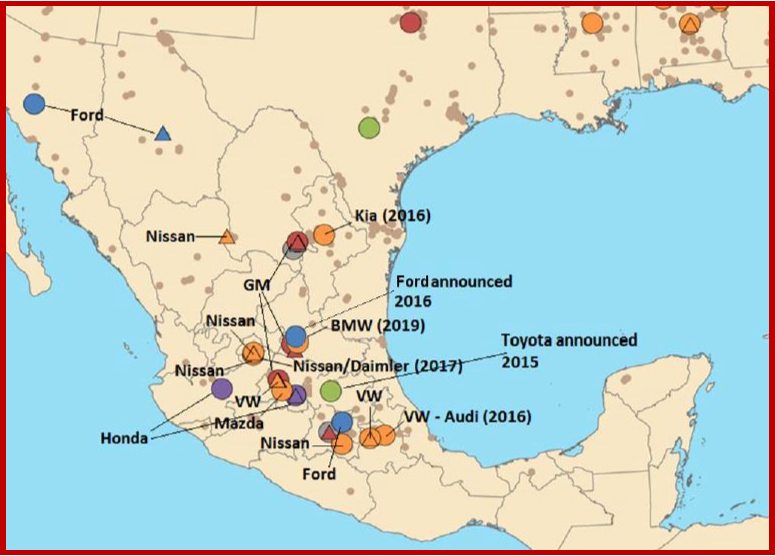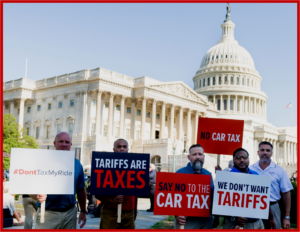
Since 2009, automakers – including BMW, Honda, Hyundai-Kia, Mazda, Nissan, Toyota, and VW/Audi—have announced eight new assembly plant investments in Mexico totaling $9 billion. However, Mexico’s low labor costs may no longer be key to these deals; Mexico’s free trade agreements allow manufacturers to reach customers in countries representing 60% of the world’s GDP tariff-free.
The Trump Administration claims it has a preliminary United States-Mexico Trade Agreement “that modernizes and re-balances the trade relationship to reflect the realities of the 21st century.” This is the first time that a modern United States trade agreement has been renegotiated. (see Trump Tantrum on Trade Kills Jobs, Distracts from Expanding Russian Collusion Investigations and Criminal Indictments)
According to the Center for Automotive Research’s (CAR) latest trade briefing, applying a Trump’s 25% tariff on all automobile and parts imports would result in 2 million fewer U.S. vehicle sales, 715,000 fewer U.S. jobs and nearly $60 billion in lower U.S. economic output. The policy would increase the price of the average vehicle sold in the United States an average of $4,400 (including both domestic and imported products).
 In a White House ceremony Trump touted the preliminary agreement with Mexico as a deal that could replace NAFTA. He threatened to impose auto tariffs on Canada if it did not “negotiate fairly.”
In a White House ceremony Trump touted the preliminary agreement with Mexico as a deal that could replace NAFTA. He threatened to impose auto tariffs on Canada if it did not “negotiate fairly.”
Pay No Attention to that Man Behind the Curtain
CAR notes that since 2009, automakers — including BMW, Honda, Hyundai-Kia, Mazda, Nissan, Toyota, and VW/Audi — have announced eight new assembly plants investments in Mexico totaling $9 billion. What is missing from the job debate is that Mexico’s low labor costs may no longer be key to these investments; Mexico’s free trade agreements allow manufacturers to reach customers in countries representing 60% of the world’s GDP tariff-free.
In an apparent step toward partially ending a trade war Trump started, it’s claimed the Mexico Trade Agreement “will create more reciprocal trade that grows the economy, supports high-paying jobs for American workers, and protects American intellectual property.” Well, you never know it from the White House, but this is NAFTA renamed as the core of that agreement remains in place.
New, sketchy “rules of origin” requirements are said to incentivize billions a year in vehicle and automobile parts production in the United States, supporting high-wage jobs. Proof here remains in murky futures – both Trump’s, the Republican party, as well as the economy.
One thing to consider before reading the misleading White House statement below: Some of the benefit of lower labor costs in Mexico is offset by the higher worker attrition rates than found in U.S. assembly plants. However, labor cost savings only account for about half of the cost savings for vehicles that are then sold in the United States, and less than 15 percent of the total cost advantage for vehicles that are exported from Mexico to Europe for sale, according to CAR.
“NAFTA has contributed to the U.S.’s ballooning annual goods trade deficit, which grew from $115 billion in 1993, the year before NAFTA’s implementation, to nearly $800 billion in 2017. The United States went from a $1.6 billion goods trade surplus with Mexico to a $70 billion goods trade deficit during that same time,” according to the White House.
Whether tinkering with the agreement will help American workers in any meaningful way as wealth inequality continues to grow remains to be seen.


Congressman Sander Levin (D-MI) on an agreement between the United States and Mexico on a renegotiated North American Free Trade Agreement or NAFTA. [Editor’s note: Representative Levin comes from the party that promoted and passed NAFTA. U.S. President Ronald Reagan initiated the idea. The required ratification and signing of the implementation law was ultimately done by incoming president Bill Clinton.]
“Meeting with a group of workers in Mexico who were fired from their jobs in a tire factory after they went on strike to protest wages of less than $2 an hour made it crystal clear how far Mexico still has to go to ensure real labor rights. These workers are trapped in contracts that they never voted on or had any involvement in – signed before there were even any workers on the job. Now they are facing unemployment, blacklisting, harassment and threats for attempting to demand their rights. If a rewrite of NAFTA fails to forcefully and directly address this issue, the result will just be more downward pressure on American workers’ wages and outsourcing of U.S. jobs to very low-wage Mexico.
“Foreign companies have come to Mexico and exploited workers in combination with Mexican authorities to export products to the U.S. – products that these workers could never afford themselves. This exploitation negatively affects the jobs and wages of workers in the U.S.
“After today’s announcement that the U.S. and Mexico have come to an agreement on a revised NAFTA, it remains highly unclear whether there will be assured, substantial change in the status quo on this key issue. Unfortunately, Members of Congress have not seen the reported agreement, despite statutory requirements for full consultation. But reports to date leave major questions about the specific rights of workers to overturn the thousands of unfair ‘protection’ contracts now in place in Mexico, as well as the mechanisms to effectively enforce these rights.
“I strongly urge the Administration to stay at the bargaining table as long as it takes to ensure a good deal for America’s workers, and to consult with Congress as required by law.”